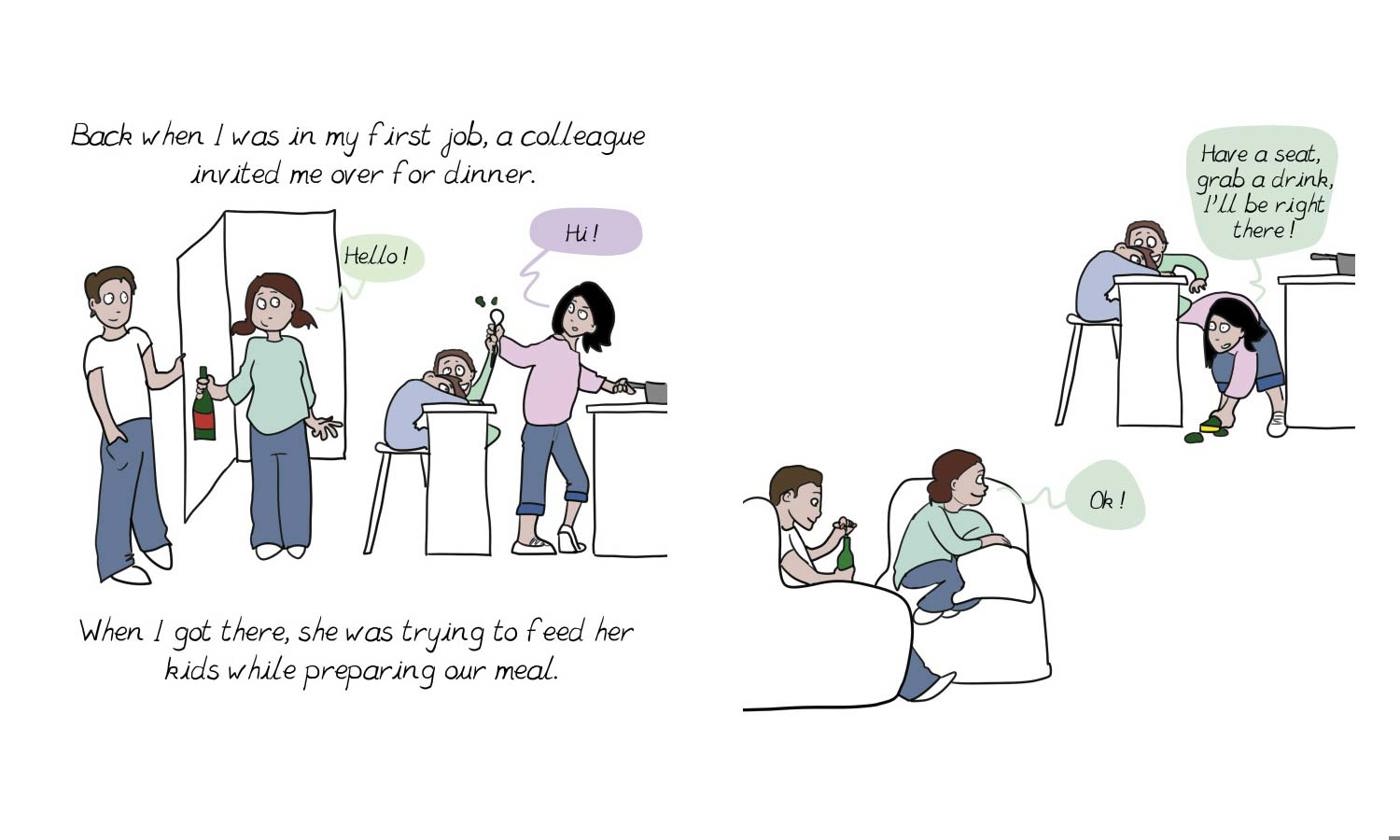Like what you see?
Sign up to receive more free parenting advice.
Thank you for subscribing to our newsletter!
Lifestyle

Credit: iStock.com/aluxum
You know what it’s like when you’re the one who has to remember it’s your mother-in-law’s birthday on Wednesday, there’s no milk left in the fridge for breakfast, the electricity bill is due and if you don’t put a load of washing on no-one will have clean underwear for the morning.
While marriage is a partnership, and in a Utopian relationship this mental load is shared equally, more often than not partners find that responsibility for remembering falls to one more than the other.
It has a habit of falling to the partner who is not in full time employment which in Australian households is predominantly women who are often responsible for child care and have part time roles. These women statistically are already doing the lion’s share of household duties.
The 2016 Census results showed that while a typical Australian woman spends between five and 14 hours a week doing unpaid domestic housework, in the week prior to the census one in four men say they had done none1. They hadn’t mowed a lawn, washed a dish or cleaned a toilet.
French comic artist Emma went viral with her take on the mental load “You should’ve asked” striking a chord with many who saw their lives reflected in her explanation, and striking a nerve with some who thought her views were too harsh on men.
The comic begins with Emma attending a dinner party with friends where the mother is feeding the children and preparing dinner while the father sits with her as the guest, only to be surprised when the meal boils over. The father questions what happened. The mother explains that she was trying to do everything and the father looks bewildered saying that she should have asked for help.
Emma goes on to explain that by expecting to be asked, the father is setting up the mother as the manager with all the responsibility and himself as the underling. The problem being that managing everything and knowing what needs to be done to manage a family and a household is a full time job.

Understanding the substantial impact on families of relationship breakdown, University of Melbourne Senior Lecturer in Sociology Dr Leah Ruppanner and her colleagues have been examining equality in parenting duties and its impact on relationships.
In a 2017 study2 based on data from the nationally representative 2011 Canadian Work, Stress, and Health Survey Dr Ruppanner found inequality across housework and parenting jeopardises relationship quality.
The study which investigated the relationship between parenting inequalities and feelings of relationship quality, found working mothers assumed a larger parenting share, and this inequality deteriorated relationship quality – but only under certain conditions. It deteriorated when mothers perceived their parenting division as unfair, or when they felt trapped in their primary carer role.
Dr Ruppanner says that inequality in duties did not just come in the form of housework and childcare.
While a great deal of attention is paid to the division of physical labour in the home and child care, who carries the mental load is just as important.
“The challenge for many modern families is that everyone is tired. The mental load and the domestic duties associated with children are incessant. What is more, the demands of work are also never-ending. And, if these duties remain deeply gendered, it means women continue to carry more of the mental load, housework and childcare. For many women, especially those balancing a job and a family, these demands are untenable. Add a lack of sleep and complete exhaustion on top and people are just emotionally burnt out.”Dr Leah Ruppanner
The mental load is all of the mental energy that is needed to get us through our day to achieve our tasks.
The mental load includes the planning work required to ensure the children make it to Bollywood dancing, the refrigerator is stocked for dinner and the smoke detector battery gets replaced. It's incessant, gnawing and exhausting, and disproportionately falls to women.
If women are already disproportionately responsible for the housework and then they also need to organise what’s for dinner, school holidays, birthdays, holiday seasons and who is going where. That’s a lot of responsibility and effort.
“If men are not responsible for the mental load they can come home and relax or if their mental load is going anywhere it can go to how can I be my best to achieve what I can tomorrow and advance my career,” Dr Ruppanner says.
“He’s thinking about the next step in his career how to strategise promotion and she is spending her mental load thinking about whether the kids have clean underwear. One has an economic benefit, and the other is making sure the family is cared for which is important, but it is not paid.
“What this says about the mental load is if I’m doing all the childcare and unpaid work and he does all the paid work and is able to switch off he is ‘entitled to relax, entitled to rest, entitled to watch tv’ and I’m not because there are piles of laundry, a child who needs attention, dishes in the sink and a dinner that needs to be made. And these things never stop.
“That is going to lead to serious resentment between me and him.
“This idea that he is entitled to leisure because he works all day, because he needs to switch off and prepare for tomorrow, but I don’t need to switch off because housework is not valued as a ‘real job’ because there’s no financial pay is problematic. It suggests I’m never entitled to leisure because there’s always work to be done.”
“Men today are more interested in caring for children, sharing the housework and being equal in all dimensions of family life. But the structure of work still requires long hours and complete devotion to succeed. This means men often feel trapped between institutions that demand their all and their desires to be more connected and present in their family lives.”Dr Leah Ruppanner
Dr Ruppanner says husbands don’t have it easy either.
“Men today are more interested in caring for children, sharing the housework and being equal in all dimensions of family life. But the structure of work still requires long hours and complete devotion to succeed. This means men often feel trapped between institutions that demand their all and their desires to be more connected and present in their family lives,” she says.
Dr Ruppanner says the resentment caused by the inequality in the division of duties in a relationship can have long standing consequences for families.
“The challenge for many modern families is that everyone is tired. The mental load and the domestic duties associated with children are incessant. What is more, the demands of work are also never-ending. And, if these duties remain deeply gendered, it means women continue to carry more of the mental load, housework and childcare. For many women, especially those balancing a job and a family, these demands are untenable. Add a lack of sleep and complete exhaustion on top and people are just emotionally burnt out,” Dr Ruppanner says.
Australia’s most recent divorce statistics show that 48,517 divorces were granted in 2015.
Couples with children account for almost half of the divorce rate, with 47.5% of all divorces in 2015 involving children. That represents a total of 42,303 children. While approximately 1 in 3 marriages ended in a divorce, fewer people are actually getting married so the true indication of modern relationship breakdown isn’t available without considering the separation rates of people in committed relationships and this is much harder to quantify.
Dr Ruppanner says there are ways to cut back on mental load.
“By identifying the mental load in our lives and its impact on our mood, relationships and productivity we can reduce its impact,” she says.
Dr Ruppanner says it’s up to women to recognise the impact of the mental load on their lives and take a break. The goal of the break is to feel your mental load and for others to see the gaps so the mental load can be identified, reduced and redistributed.
She says it’s also important to reduce your expectations and accept that you don’t need to have a perfect house and perfect children. If you stop judging yourself and others, you can reduce pressure around the need to feel that your home is not tidy enough, your family’s clothes are not impeccable and your meals are not gourmet.
Dr Ruppanner’s final advice is that it’s okay to delegate tasks. You don’t need to be responsible for everything. Family members will learn from their mistakes. Simply allocate tasks and don’t judge if it doesn’t quite work out the way you hoped.
Divorce in Australia
- The median duration of marriage to divorce increased from 11 years in 1995 to a peak of 12.6 years in 2005. After slowly decreasing since 2005, the median duration of marriage to divorce increased by 0.1 to 12.1 years in 2015.
- Over the last 20 years, the proportion of joint applications for divorce has been increasing. In 2010, the number of joint applications outnumbered male applications and female applications for the first time. It remains the highest applicant type at 43.3% of all applications.
- Queensland had the highest crude divorce rate of 2.3 divorces per 1,000 estimated resident population, while the Northern Territory had the lowest divorce rate at 1.6 per 1,000 estimated resident population.
- Australian Capital Territory and Tasmania reported the highest proportion of all divorces involving children, at 51.1% and 50.7% respectively. The Northern Territory (43.1%) and Victoria (45.3%) reported the lowest proportion of divorces involving children.
- Tasmania had the highest median ages at divorce for males and females in 2015. The median age at divorce for males was 47.4 years in Tasmania and for females, the median age at divorce was 44.9 years.
Get Advice
Real parents. Real problems. We’re here with a group of leading early learning and parenting professionals to answer your questions.






